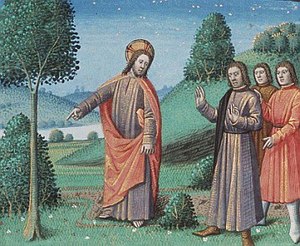Yesterday in Rome some of the seminarians from the USA received the minor ministry of Acolyte from Archbishop J. Augustine DiNoia, OP, 68, native of the Bronx, NY, and vice-president of the Pontifical Ecclesia Dei commission. Don't miss the gardner ... he's important in Jesus' narrative. Part of DiNoia's homily is here.

Our Lord's examples in today's Gospel are like this--instances of catastrophes everyone has heard about. He anticipates what his hearers might be thinking: do these events have some religious or moral significance? Were the Galileans whose blood Pilate mixed with their sacrifices greater sinners than all other Galileans, or were the eighteen people upon whom the tower in Siloam collapsed greater sinners than all the inhabitants of Jerusalem?
His response to the questions he poses is brief and deceptively simple. The lesson to be drawn from these events is most surely not that those who perished were greater sinners than those who survived or were entirely unaffected. Rather it is this: if we do not repent, all of us will perish. In fuller terms the point is that since all of us are sinners, and the end of life can be so unexpected, then there can be no reason to postpone repentance. Nothing is to be gained by procrastination. If we knew that our lives were going to come to an end on such and such a day in the future--say, ten years from now--then we could delay repentance until a safe interval before that date. But we don't know this. Death will be as unexpected for us as for those who perished in these catastrophes.
Our Lord underscores precisely this point by means of the parable of the fig tree. Though the fig tree has been barren for three years, the owner of the orchard agrees to give it a reprieve: one more year. Likewise, God is patient with our procrastination, with our failure to bear the fruit of true repentance, but not indefinitely so. "With fear and trembling," says St. Gregory the Great, "should we hear the words...., 'cut it down'.... He who will not by correction grow rich unto fruitfulness, falls to that place from whence he is no longer able to rise by repentance."(Homily 31 on the Gospel of Luke).
But there is a bright side to today's sobering Lenten message--as it happens something wonderfully apt on this occasion of the Institution of Acolytes. It is to be found in the humble figure of the gardener in the parable of the fig tree. For it is at his suggestion--we might well say his intercession--that the owner of the orchard gives the barren fig tree yet another year. "Let us not then strike suddenly," says St. Gregory Nazianzen, "but overcome by gentleness, lest we cut down the fig tree still able to bear fruit, which the care perhaps of a skillful dresser will restore" (Oration 32). Not only does the gardener put in a good word for the fig tree, but he has a plan for improving its chances of bearing fruit in the coming year: to dig around the tree and fertilize it, to give it special care.
The figure of the gardener is easy to miss, but in the rich tradition of patristic commentary on this parable he gets a lot of attention. A particularly significant reading of the parable sees him as representing Christ who implores the Father to allow him to water the tree with his teaching and his sufferings so that it will yield the fruit of repentance and good works.
Archbishop J. Augustine Di Noia, O.P.
Third Sunday of Lent: Institution of Acolytes
3 March 2013
Pontifical North American College, Rome


Leave a comment